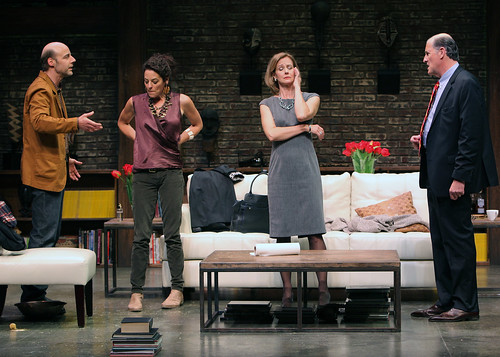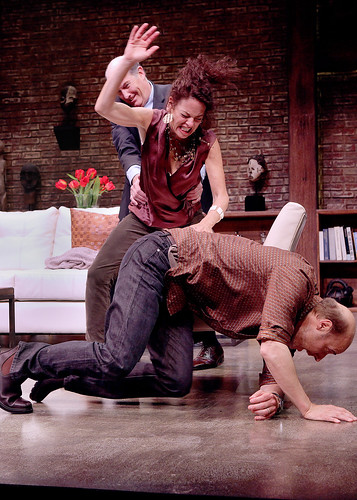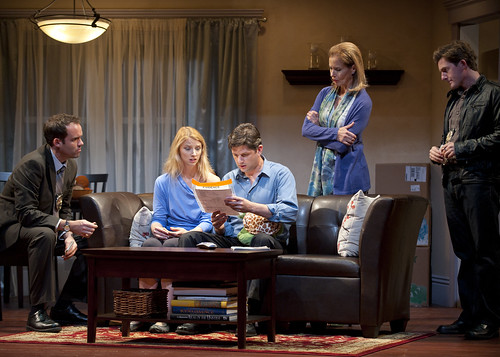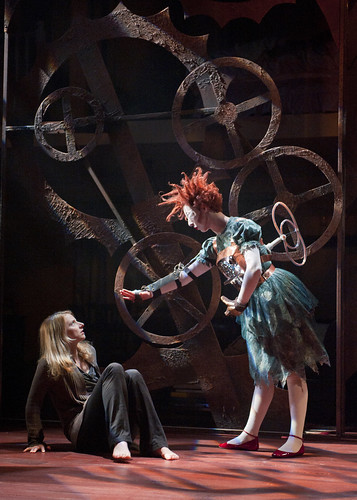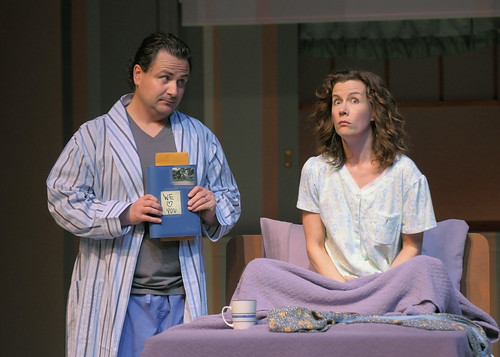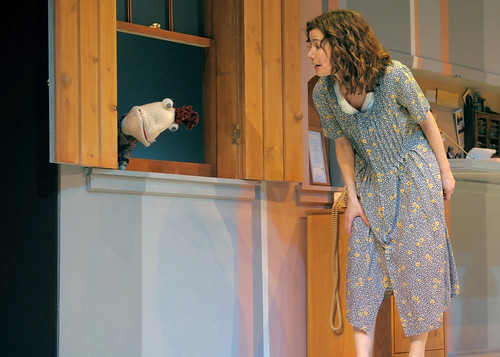Oh, the carnage. The cast of Marin Theatre Company’s God of Carnage comprises, from left, Remi Sandri, Stacy Ross, Rachel Harker and Warren David Keith. Below: Ross works out some of her frustration on Sandri as Keith watches. Photos by Ed Smith
Watching four people try to practice “the art of coexistence,” as the playwright puts it, is entertaining but ultimately depressing in Yasmina Reza’s God of Carnage at Marin Theatre Company. One of the hottest plays in recent memory, Carnage is the perfect storm of contemporary drama. It has one set, four actors and that perfect blend of satirically repulsive comedy and apparent moral heft. Oh, and it has impressive vomit special effects and that most satisfying of dramatic dénouements, the destruction of a mobile phone.
What it doesn’t have – not even in this brilliantly produced MTC version – is a satisfying reason for being. It puts on a good show with a few laughs (some guilty, some not) and the can’t-turn-away watchability of a horrible traffic accident where you have that fleeting feeling that it could have been you in that gnarled, bloody mass of steel and glass. But it doesn’t turn those elements into anything larger or more profound or even profoundly funny.
If you’ve seen the Roman Polanski movie version of the play (called simply Carnage), you haven’t really seen it. The movie, starring Kate Winslet and Jodie Foster, is dreadful from start to finish. Watching it, you feel like the play should have never left the stage, where the audience plays a huge role with outsize reactions and a heightened sense of absurdity. We’re all in it together in a theater exercising our willing suspension of disbelief (a real asset to Reza’s play), but the movie plays it like reality, and that absolutely makes mincemeat of Carnage.
The great pleasure of MTC’s Carnage is the quartet of actors under the direction of Ryan Rilette. It’s all about game playing and false fronts and shifting loyalties as two couples gather in a Brooklyn apartment to discuss an act of 11-year-old on 11-year-old violence. One couple’s son bashed the other’s son in the face with a stick, so the parents are making like grown-ups and discussing it with broad-minded civility.
The good intentions and strained smiles last for a few minutes at best, then the claws start to emerge and the ugliness descends. What spins out for 80 minutes is humiliation, rum, optimism, pessimism, brutality, savagery, pettiness and a pear-apple clafouti that will forever give that dessert a bad name.
Stacy Ross and Remi Sandri are Veronica and Michael Novak, the kind of hip, successful parents you imagine living in a Brooklyn apartment decorated with lots of cool African masks on the walls (the set by Nina Ball is exaggerated perfection). He deals in domestic hardware and she writes books about the massacre in Darfur. Warren David Keith and Rachel Harker are Alan and Annette Raleigh, seemingly another category of parents. He’s a high-powered lawyer (he’s trying a case in The Hague and says things to coworkers like “We’ll think about the victims later, Murray.”) and she’s in wealth management. He’s always on his phone tending to business and she…well, she is hard to peg until the rum starts melting her mask.
This play (translated by Christopher Hampton) is a nasty piece of work, with lots of talk about “fucking Neanderthals” and the total destruction (emotionally, anyway) of the one character who claims to care about culture and society and civilization and all it stands form. But the most depressing thing about these four people is their almost total lack of humor. “I don’t have a sense of humor and have no intention of acquiring one,” says Veronica. Now that hurts. The one thing that might engender connection among these people (even among the spouses themselves) is a good laugh, perhaps not at another person’s expense or fueled by hatred or rage or utter disgust.
Reza is satisfied to turn her cosmopolitan quartet into a snarling clutch of wild animals, weeping and bemoaning the world and one another. And it’s not enough. It’s not a fully satisfying evening of theater. The play doesn’t have the courage to head into complete despair, nor does it have the boldness to offer some sort of alternative (except maybe a hint of loving and caring for your children above all other petty distractions). The best we can hope for, according to Alan, is “one pain the balls after another.” Ouch.
FOR MORE INFORMATION
Yasmina Reza’s God of Carnage continues through June 17 at Marin Theatre Company, 397 Miller Ave., Mill Valley. Tickets are $34-$50. Call 415-388-5208 or visit www.marintheatre.org.

